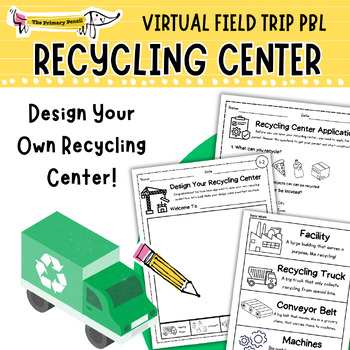Design A Recycling Center! | Virtual Earth Day Field Trip & PBL Activity
The Primary Pencil
461 Followers
Grade Levels
K - 3rd
Subjects
Resource Type
Standards
CCSSW.K.7
CCSSW.1.7
CCSSW.2.7
CCSSW.3.7
CCSSW.3.10
Formats Included
- PDF
The Primary Pencil
461 Followers
Also included in
- Bring Earth Day awareness to your classroom and become recycling heroes! This project-based learning (PBL) science bundle Includes 3 lessons that build real-life connections! Students will learn recycling concepts with a science reader and STEM craft challenge, See the inside of a recycling center wPrice $8.00Original Price $10.50Save $2.50
Description
Elevate your Earth Day with this K-3 project-based learning activity! See the inside of a recycling center with a virtual field trip! Students learn about the recycling process beyond the bin. They will gain an understanding of each step while envisioning their own facility designs. Following the virtual tour, students engage in hands-on learning by applying their knowledge to obtain a construction permit and embark on designing their own recycling centers.
This is lesson 2 in Recycling Heroes: Science PBL Bundle!
Product Features:
- Lesson Plan
- 2 Virtual Field Trip Videos (K & 1-3)
- 12 Vocabulary Label Cards (Basic Labels, Facility Locations, & Facility Machines)
- 4 Recycling Center "Student Applications"
- Printable "Construction Permits"
- 3 Design Your Recycling Center Worksheets
More Primary Pencil Project-Based Learning!
Don't forget that leaving feedback earns you points toward FREE TPT purchases.
Be sure to FOLLOW MY STORE and be notified when new products are uploaded!
Total Pages
Answer Key
N/A
Teaching Duration
N/A
Report this resource to TPT
Reported resources will be reviewed by our team. Report this resource to let us know if this resource violates TPT’s content guidelines.
Standards
to see state-specific standards (only available in the US).
CCSSW.K.7
Participate in shared research and writing projects (e.g., explore a number of books by a favorite author and express opinions about them).
CCSSW.1.7
Participate in shared research and writing projects (e.g., explore a number of “how-to” books on a given topic and use them to write a sequence of instructions).
CCSSW.2.7
Participate in shared research and writing projects (e.g., read a number of books on a single topic to produce a report; record science observations).
CCSSW.3.7
Conduct short research projects that build knowledge about a topic.
CCSSW.3.10
Write routinely over extended time frames (time for research, reflection, and revision) and shorter time frames (a single sitting or a day or two) for a range of discipline-specific tasks, purposes, and audiences.




